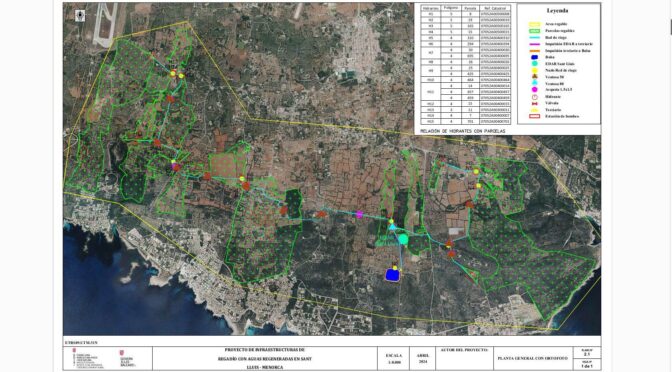Views: 1135
The chlorides in the treated water intended for irrigation in Sant Lluís double the maximum permitted levels. Over half of the water reaching the treatment plant may also contain other contaminants. Seven public supply wells could be affected if contamination occurs.
The GOB has submitted objections to the reclaimed water irrigation project that the Balearic Government’s Agriculture Department is promoting in Sant Lluís, warning of its lack of guarantees and the high contamination risks associated with it.
The current water could salinize the land and the aquifer
According to 2023 data provided by Abaqua, the Sant Lluís treatment plant records chloride levels of 475.33 mg/l. It is prohibited to irrigate with reclaimed water when chloride levels exceed 250 mg/l.
This means that the project is being promoted despite nearly doubling the maximum allowable chloride concentration. Given the data, the project should be halted due to the serious risk of salinizing the areas intended for irrigation.
The water may contain other dangerous substances
Sant Lluís has an industrial estate, creating a constant risk of receiving industrial components that treatment plants cannot filter out, including potentially harmful and persistent substances.
Municipal wastewater is collected by the sewage network and treated to reduce contamination before being discharged back into the environment or reused. However, there are substances that treatment plants cannot capture or eliminate that are found in the effluent. This is the case for the water intended for irrigation.
Moreover, a report from the Balearic Water and Environmental Quality Agency warns that 61.6% of the sewage water reaching the Sant Lluís treatment plant does not meet regulations.
Seven public wells are near the irrigation area
Seven public supply wells are located near the planned irrigation zones:
- Binisafúller 1
- Binisafúller 2
- Ctra Nord B. Vell
- Ctra Sud B. Vell
- Creuer Pta Prima Nord
- Creuer Pta Prima Sud
- Ctra Alcalfar Nord
Unclear benefits of replacing groundwater
One of the main arguments for this project is the supposed reduction in aquifer extraction. However, neither the project nor the environmental impact study provide any reliable estimation of this potential reduction.
According to Spanish law, all water concession holders must install and maintain systems to measure and report water consumption. Yet, the project documentation admits that valid data on water extraction in Sant Lluís is not available. In 34 of the 51 wells described, the depth of the extraction pumps is unknown.
Not included in the 2023 Hydrological Plan
The Sant Lluís Hydrological Plan, approved in 2023, does not foresee any projects like this one. Instead, it focuses on improving the treatment plant and launching studies on aquifer recharge and water storage. Despite this, an €8 million project is now being promoted, surpassing the combined budget of all other initiatives in the municipality.
Risk to aquifers without guaranteed savings
The worrying data are well known to the public institutions promoting this initiative. It is incomprehensible to push forward with irrigation using water that exceeds chloride limits and without safeguards against other contaminants. The project also lacks clarity on current water extraction levels in the affected area.
Good water management is increasingly critical. We must stop investing in large projects that are justified only by their financial size and start focusing on effective resource management.

